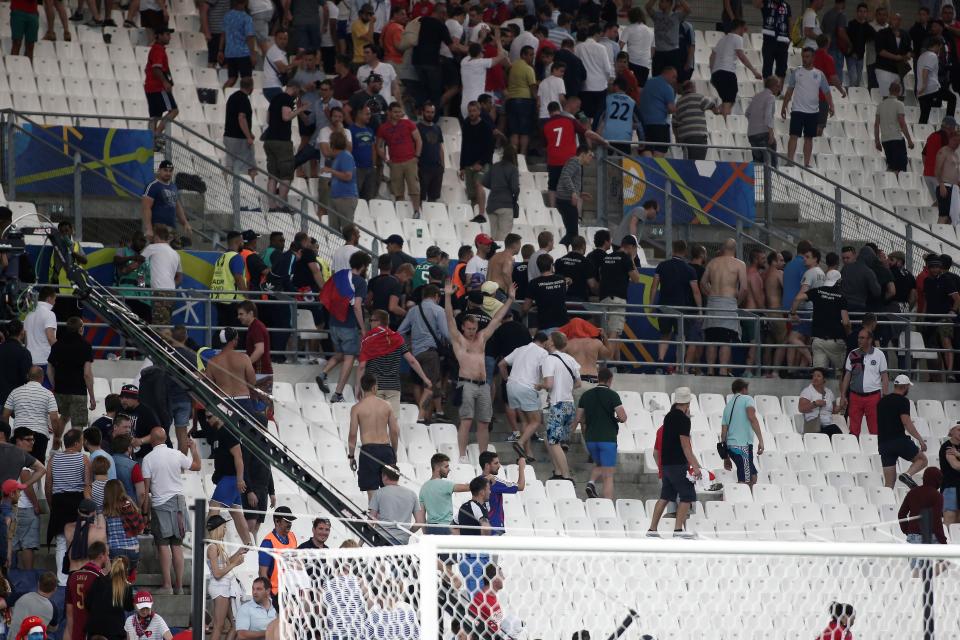Russian hooligans still prepared to do battle - just not at the World Cup

A repeat of the horrific scenes in Marseille two years ago have failed to materialise at this World Cup, despite fears of such keeping many fans away. One hooligan has told Yahoo Sport that the hooligans are still there, but they have no interest in attacking English fans, especially not at the World Cup.
Past the halfway point at the World Cup and it has come as welcome relief that there has not been a hint of trouble.
It is common knowledge out here in Russia that the FSB – the successor to the KGB – had been in out in force pre-tournament, letting the most notorious Russian hooligans know, in no uncertain terms, that if they so much as showed their face near a World Cup match, they would face rather heavy-handed punishment.
However, there is only so much threats can stave off. Many fans from all over the world have stayed away from the World Cup in fear of these weapon-wielding thugs causing mayhem, just as they did on the French Riviera two years ago.
Thus far, though, there has not even been even a suggestion of anything resembling the smallest of skirmishes.
So where are they all? Not even one lone hooligan, wanting to make a name for himself, could have escape the attentions of the FSB? Despite all the negative press pre-tournament, it seems these blood-thirsty savages, as they have been depicted, just want to be excellent hosts.
READ MORE: The 32: Neymar will mature and cut out theatrics, says Wise
READ MORE: Rooney shuts down ‘unfair’ World Cup question
“The hooligan element in Russia comes from this desire to be like English football,” Artem Sirotkin, member of the FC Volga Ultras, from host city Nizhny Novgorod, tells Yahoo Sport. “Especially from the old days – why would we then target English fans for no reason?
“After we came out of communism and all these football clubs were formed, for many things we looked at the west as the example, and fighting was no exception. We used to take songs from British teams and use them. We have no resentment towards the English, we took a lot from you. Even local provincial teams sing English songs.

“The hooligan groups still exist – they just want to have a good time with foreigners
“We are proud of our country and our cities. We are more interested in showing the world that we can have fun and not just fight, not because we have been told to by the government, but because we want to.”
Most investigative features into hooligan life in Russia, or what Premier League teams have encountered in European club competition, centres around Moscow and its successful clubs – the other cities just are not in the spotlight, and their clubs suffer.

Two of the clubs that rose out of the Soviet era – FC Volga and FC Nizhny Novgorod – have folded due to financial problems, with newly-formed side FC Olimpiyets attracting less than 1,000 fans to their games. Plans are afoot for Olimpiyets to move into the stadium built for the World Cup in Russia’s fifth biggest city after the tournament.
READ MORE: Kroos retiring would hurt Germany, says Matthaus
READ MORE: Rough treatment ‘normal’ for Neymar
However, just because the clubs no longer exist, does not mean the hooligan groups have dispersed.
“When both of our clubs were at their height, before 2012, our club’s group were like any other hooligan group – meeting for organised fights. The hooligan groups are still there, but we are not desperate for a fight that many think. We will return again some day, hopefully when our clubs return.

“It would be like 50 on 50, and it be would organised properly, away from the city, into the forest, and have a real fight. None of this shouting outside the ground before the game like you may think.”
The fire certainly still burns behind the eyes. A diminutive figure who looks like he would not say boo to a goose, when asking about why Russians appeared to target England fans in Marseille, with weapons, the aggression in Artem is palpable.
“Most hooligans are under their club banner, as opposed to a Russian banner,” he continues. “The only time that everyone united and fought under the Russian banner was in Marseille.
“That happened because there were so few there that they had to group together to stand up for Russia. The English got away with it in Russia – they did everything they could to provoke Russians. The English got what was coming to them. It was not a non-provoked attack.

“There were many stories in the English media that some sort of special services were sent over to Marseille to beat up English fans – that is bulls***
“Of course, most of them were from the army but that is because everyone has national service. The majority of people that are not from wealth serve in the army. You do not need any special services to beat up a bunch of drunken English fans.
“The hooligans travelled to Marseille prepared for anything to happen. Without the provocation nothing would have happened – but they had to be ready. They were with our mates who we fight with at the weekend anyway – it was nothing they could not handle, again, if provoked.
“So few English fans have arrived here, and it would have been a more organised thing, it is almost like what is the point – we would rather show our strength to the Polish, the Serbs and the Ukrainians. We want to welcome guests and have fun, we are normal people, but if something happened, it will happen.”
The conversation ended there, with the message loud and clear that provocation, by a journalist asking questions, or England fans in the street will still not be welcome.
Russian hooligans certainly aren’t as animalistic as depicted, but probe away, and you can still find trouble if you want it, World Cup or no World Cup.

 Yahoo Sport
Yahoo Sport 







































